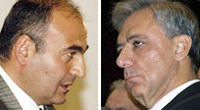“…It’s impossible not to take note that in this project of creating a “variety of centralized occupations” for “all individuals” by the “governing individuals” in the “government of individuals”, the internal (i.e. social) and international integration components are pushed to the background.”
If any villager of Armenia considers me as a citizen, better yet, a journalist from the city and asks me to interpret the abovementioned sentence, I swear to God that I’ll be tied in a knot; not because I never paid attention to my parents’ insistence to finish my higher education, but rather because all the classical writers of world literature, starting from Homer and ending with Orhan Pamuk, have taught me to speak humanly.
I can’t explain to the Armenian villager what the “thousand-year existential crisis” means. But I can tell him that Armenia has managed to become perfectly isolated through the means of “confrontation”-one of the two versions of overcoming the crisis- and we aren’t able to get out of that isolation by “integration” because we haven’t gotten rid of the consequences of the “confrontation”.
So, since the Armenian villager has found himself in isolation, it will be very difficult to explain to him that it is necessary to “construct individual goals and strives as general interests of the public and demands of the state.” It will also be difficult to assign the villager “to provide centralized occupations”, taking into consideration the fact that the isolation caused by the failure of “confrontation” helps the leader of the country and the few people on his side to brighten the “individualistic-familiar state of being”, which has brought forward “dichotomy”. In contemporary Eastern Armenian, this means “the consistent division of the total in two parts”. Although the dictionary doesn’t give a detailed description of the voluminous relationship between the two, however it’s not hard to understand that majority of Armenians still haven’t managed to “realize their ideal for individual prosperity” not only as an oligarch, “but also as a scientist or engineer, artist and pedagogue, an expert of advanced technologies and the intellectual.”
If the Armenian villager asks whether the lack of “institutional structures during the international integration process” wasn’t the reason for leading to isolation, I will once again have difficulty in answering because, as I see it, the reason for not realizing the ideal is the lack of the ideal, which is propagandized day and night and is instilled in the mass media that the Armenian villager has access to-coordinating the confrontation and integration, in other words, scratch and win. But the Armenian villager doesn’t have access to see how National Assembly deputy Victor Dallakyan and Armenian Foreign Minister Vardan Oskanian dispute not only about eliminating poverty in the villages of Armenia, but also overcoming the “existential crisis”. (See “Aravot” daily, 01.16.2007, Vardan Oskanyan, “The issue matured a long time ago” article, which is the response to Victor Dallakyan’s “The keys to our future” publication).
While reading the article, at one point I thought that I was at one of the press conferences held at the “Armenia-Marriot” and “Congress” hotels where almost every day there are conferences about the benefit of integration and danger of confrontation. Then I felt that I was in one of the humanitarian departments of the university or the academy where Victor Dallakyan, who fulfilled the minimum requirements for a P.H.D. in the “Artarutyun” (Justice) alliance, wants to defend his thesis for a candidate, while his opponent-Minister Vardan Oskanian-is trying to guide his thesis.
At the end of the article, I mentally moved to the Guseyev city of Kaliningrad of the Russian Federation where I was serving in the army during the years between 1984 and 1986. On May 17, 1985, when the Supreme Council of the USSR approved the “Strengthening of the fight against Alcoholism” resolution, which is known as the Gorbachev “Sukhoi Zakon”, we soldiers tried to find out the opinion of the commander’s political affairs deputy about that “news”. The captain got so nervous and used such Russian curse words and said such a long sentence that none of us understood if he agreed with that resolution or not. It was because the captain loved to drink, but as the political affairs deputy of the commander, he just had to be in favor of the resolution passed by the supreme body of the country. In such cases, it really helps to use intricate and complicated vocabulary. When the Armenian feels that the country is slipping from his hands, wants to speak out about that but at the same time is afraid to tell the truth, the mass media turns into an epistolary where thoughts and ideas are so separate (intimate) that the reader doesn’t understand why and how the “reporters” try to fish without any bait.
Before last September, when I found out that the Ministry of Foreign Affairs of Armenia is planning to start a village development project, I was happy and uncertain at the same time. I was happy that there was finally a decision to get involved in the issues concerning the villages. I was uncertain because the project was going to be implemented by the Ministry of Foreign Affairs. I remained uncertain, while I slowly started to become less happy because in the months that followed, I had the opportunity to be in the villages and ask the villagers about the project. They knew nothing. I got even sadder because the nicely written texts about the “Rural poverty eradication program” section on the armeniadiaspora.com website didn’t become a topic for public discussion; because Armenian television channels have started using the word “highest rating” without shame when advertising soap operas, while the presses write and nobody reads.

